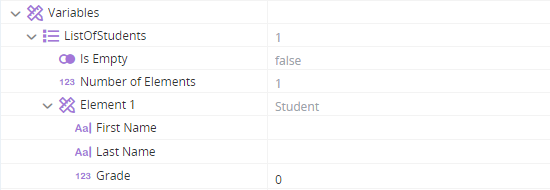(Available from version 7.0 onwards.)
Functions
Compares all the attributes of two variables to determine whether they are equal.
Parameters
|
Parameter |
Input Type |
Description |
|---|---|---|
|
Var 1 |
Variable |
The first variable to compare. |
|
Var 2 |
Variable |
The second variable to compare. |
Returns
Returns a Boolean value true if the variables are the same, or false if they are not.
Example
This example compares variable Var 1 with variable Var 2. The result, true or false, is stored in the variable Boolean_1.

Creates a temporary duplicate of a specified variable. Use this function when using the Assign function to assign the value of one complex variable to another complex variable if you do not want the values of target variable's properties to be modified if the properties of the source variable are modified.
Similarly, use this function when specifying a complex variable to add to a list if you do not want the values of the list element to be linked to the specified variable.
For more information, see Linking Complex Variables (Aliasing).
Parameters
|
Parameter |
Input Type |
Description |
|---|---|---|
|
Parameter |
Variable |
The variable to duplicate. |
Returns
Returns a duplicate of the variable of the same type as the original variable.
Example
In the example below, the complex variable Customer_A is being assigned to the variable Customer_B. The Duplicate function ensures that the values of the parameters of Customer_B will not be modified later if the values of the properties of Customer_A are modified.

In the example below, the complex variable Customer_B is being added to a list List_of_Customers. The Duplicate function ensures that the values of the element added to the list will not be modified later if the values of Customer_B are modified.

This function can be used to populate an input parameter of a function or complex variable method that expects an instance of a specific type of complex variable. Instead of specifying an existing complex variable, use this function to create a new instance of the required type on the fly.
This function can also be used to clear the values from all properties of an existing complex variable, as in the workflow shown below.

Parameters
This function does not have any parameters.
Returns
Returns a new instance of the required variable type.
Example
A project includes a user-defined type called Student which has properties for First Name, Last Name, and Grade. The project also includes a list of type Student called ListOfStudents.
The workflow below adds a new, empty Student element to ListOfStudents.

When executed, ListOfStudents now includes a single Student element. The properties of the element are empty.


